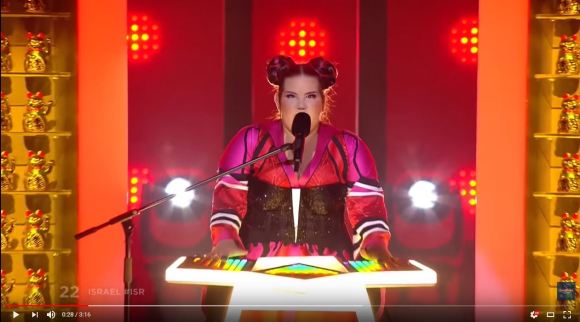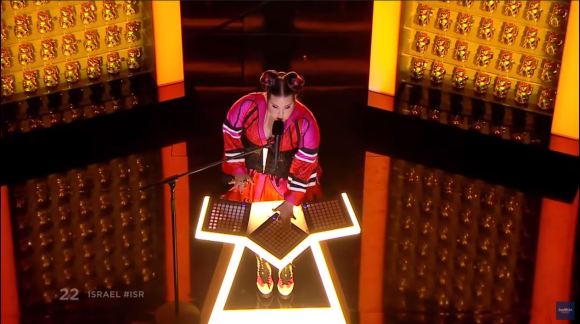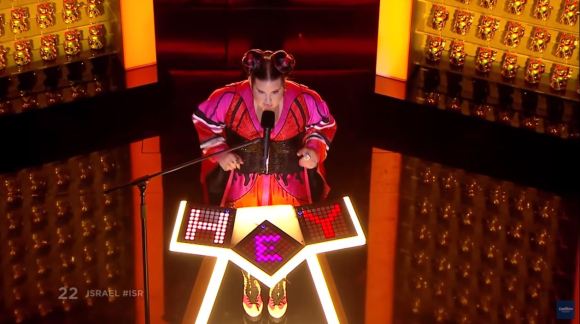
Once again, Japan comes out as the least offended when someone seemingly appropriates their culture.
The 63rd annual Eurovision Song Contest, perhaps the world’s largest example of humanity’s peculiar obsession with making music a competitive sport, came to a close last week. In the end it was Israeli singer Netta (Netta Barzilai) who took top honors with her song “Toy.”
Let’s watch!
I thought it was a rather cute and catchy song, but for the most part I was transfixed on that weird computer-type thing that Netta seemed to be operating for most of the song. Was that thing playing music or just making light patterns go off? It was like an MPC from Star Trek: The Next Generation and really distracting.
At least, it was distracting enough to lure my eyes away from something apparently far more sinister going on…“cultural appropriation!” Here is a selection of the outrage compiled by the Japanese website Yuruku Yaru.
https://twitter.com/RileyJayDennis/status/995434059567284224Can I, however, ask if anyone here has already commented on the quite shocking Japanese cultural bastardisation-appropriation going on in Netta's song?
— Joana Ramiro (@JoanaRamiroUK) May 12, 2018
https://twitter.com/DiracDrynx/status/995435292302626817Netta: "Celebrating diversity" - you do know that cultural appropriation is not diversity, right? #Eurovision #Eurovision2018 #Israel #ISR pic.twitter.com/vcC1LmY6Ud
— Jay Darcy (@jaydarcy7) May 12, 2018
I have to admit, aside from glimpsing a bunch of maneki neko (cat statues often used to attract customers into shops) in the background I pretty much missed most of this cultural thievery taking place so I watched again…and her dress kind of looked like a kimono if you squinted your eyes the right way and changed your monitor settings to black and white.
I always thought doing your hair in double buns like that was more of a Chinese thing; that or the Rebel Alliance.
▼ Japanese buns tend to be… Seriously, what the hell is that thing in front of her?!
The lyrics to “Toy” also frequently use the Japanese word “baka” meaning “stupid,” in reference to stupid men who would objectify women. Although, admittedly it’s a little weird that she makes “baka” sound like a chicken clucking. There is also a line where Netta says, “I’m taking my Pikachu home.”
Seems to me if she really wanted to co-opt Japanese culture, Netta ought to get 47 more singers and then set up a convoluted hierarchy based on sales of singles, all operating under a rigid behavioral policy similar to that of a 19th century schoolmarm.
But I could be wrong, so let’s go to the netizens of Japan for judgement.
“The millions of Japanese people with dyed hair must be laughing at this.”
“Westerners care too much about silly things.”
“Culture is meant to be stolen. If it’s not worth stealing, then it isn’t culture.”
“If people keep claiming ‘cultural appropriation’ then people will not touch our culture. Then, people will not understand our culture and it will be easier to become our enemy.”
“In a contest like this an Israeli should use their own culture to win, not steal Japanese culture!”
“The clothes and cats are Japanese. The song is Korean. The make-up and hair is Chinese.”
“If someone properly uses and appreciates Japanese culture, then I respect them for it. If not, I just don’t care about it. It’s simple.”
“Are these people using the term ‘cultural appropriation’ properly?”
Part of the confusion illustrated by the last comment is the difference in the interpretations of the English term “cultural appropriation” and the Japanese translation of bunka toyo which literally translates to the more direct term “cultural theft.”
Unlike “cultural appropriation” which is considered to be the usage of another culture without a proper understanding of it, “cultural theft” might be interpreted as one culture taking another’s and then passing it off as their own.
▼ The official video for “Toy” also briefly features Netta in kimono. The Eurovision YouTube page also links to a “karaoke” version of the song… How dare they!
It really doesn’t seem like Netta is doing either, however. Cat statues and references to Pikachu aren’t really that sacred that one needs a PhD in Japanese culture to wield them properly. One might argue that because she is representing Israel in the contest, it is a little misleading to use Japanese symbols, but the backlash is suggesting that if anything, people are attributing too much of this performance to Japanese culture.
For another perspective, free of semantics and controversy, I tried showing the video to a few Japanese people out of context, to see what they thought of it at face value. Here are their comments.
“She seems like Naomi Watanabe. I don’t like Maneki Neko though. That’s too much.”
“Is she Japanese? It all looks Chinese with the colors.”
“It doesn’t seem like the designers know much about Japan, but whatever.”
If anything, I’m a little disappointed Netta hadn’t culturally appropriated a little more. Kimono makers in Japan, who have been putting up with a steadily shrinking market for the past four decades, would surely be happy if one was sported by the reigning Eurovision champion.
▼ Here she makes that computer thing say “Hey,” but why does it do that? Why would someone create something that does that?!
The people who make these beautiful garments will not be able to survive if people who wear them outside of Japan get branded as “cultural appropriators” for doing so. Sure, if left to their own devices, there is a certainty that some people will use a kimono or another aspect of the culture of Japan ignorantly and disrespectfully, but it’s a big culture. It can take care of itself.
However, if any person who uses Japanese culture becomes instantly stigmatized and bullied out of doing so, then others will stay away from it too, and it will wither. “Protecting” culture from appropriation is like keeping a goldfish in a wine glass to “protect” it from being eaten. Cultures and goldfish would be much better off in the wild, where nature can run its course, for better or worse.
Source: Independent, Yuruku Yaru, YouTube/Eurovision Song Contest
Images: YouTube/Eurovision Song Contest



 Japanese Tumblr user drops hammer on debate of if Caucasian girl’s Japan-themed party was racist
Japanese Tumblr user drops hammer on debate of if Caucasian girl’s Japan-themed party was racist Are Japanese B-Stylers racist? Jim Jeffries investigates cultural appropriation in Japan 【Video】
Are Japanese B-Stylers racist? Jim Jeffries investigates cultural appropriation in Japan 【Video】 Is Ariana Grande “Asian Fishing”? Japanese netizens weigh in on the drama
Is Ariana Grande “Asian Fishing”? Japanese netizens weigh in on the drama Japanese Twitter seems to have no problems with Karlie Kloss’ “geisha” photo shoot
Japanese Twitter seems to have no problems with Karlie Kloss’ “geisha” photo shoot Anime song-playing, lightning-shooting Tesla coil is world’s coolest high school science project
Anime song-playing, lightning-shooting Tesla coil is world’s coolest high school science project How to order snacks on a Shinkansen bullet train in Japan
How to order snacks on a Shinkansen bullet train in Japan New Pokémon ice cream, dessert drinks, and cool merch coming to Baskin-Robbins Japan【Pics】
New Pokémon ice cream, dessert drinks, and cool merch coming to Baskin-Robbins Japan【Pics】 Japan’s new difficult-to-drink-from beer glass protects your liver, but it’s a brutal experience
Japan’s new difficult-to-drink-from beer glass protects your liver, but it’s a brutal experience Demon Slayer: Kimetsu no Yaiba gets new roller coaster attractions and food at Universal Studios Japan
Demon Slayer: Kimetsu no Yaiba gets new roller coaster attractions and food at Universal Studios Japan Burger King Japan suddenly adds Dr. Pepper and Dr. Pepper floats to its menu nationwide
Burger King Japan suddenly adds Dr. Pepper and Dr. Pepper floats to its menu nationwide High-fashion Totoro cuddle purse is like an elegant stroll in the forest【Photos】
High-fashion Totoro cuddle purse is like an elegant stroll in the forest【Photos】 Hello, cosmetics! Clinique teams up with Hello Kitty this summer for first-time collaboration
Hello, cosmetics! Clinique teams up with Hello Kitty this summer for first-time collaboration To combat declining birth rate, Japan to begin offering “Breeding Visas” to foreigners
To combat declining birth rate, Japan to begin offering “Breeding Visas” to foreigners Russian crocodile hospitalized after woman falls on it
Russian crocodile hospitalized after woman falls on it Starbucks Japan welcomes alpacas for cute summer drinkware line【Photos】
Starbucks Japan welcomes alpacas for cute summer drinkware line【Photos】 Nintendo history you can feel – Super NES, N64, and GameCube controllers become capsule toys
Nintendo history you can feel – Super NES, N64, and GameCube controllers become capsule toys “The most Delicious Cup Noodle in history” – Japan’s French Cup Noodle wins our heart【Taste test】
“The most Delicious Cup Noodle in history” – Japan’s French Cup Noodle wins our heart【Taste test】 Starbucks releases a cute Frappuccino and Unicorn Cake…but not in Japan
Starbucks releases a cute Frappuccino and Unicorn Cake…but not in Japan Kyoto Tower mascot termination reveals dark side behind cute Japanese characters
Kyoto Tower mascot termination reveals dark side behind cute Japanese characters McDonald’s Japan’s Soft Twist Tower: A phantom ice cream only sold at select branches
McDonald’s Japan’s Soft Twist Tower: A phantom ice cream only sold at select branches Yabai Ramen: What makes this Japanese ramen so dangerous?
Yabai Ramen: What makes this Japanese ramen so dangerous? Finally! Nintendo Japan expands Switch 8-bit controller sales to everybody, Online member or not
Finally! Nintendo Japan expands Switch 8-bit controller sales to everybody, Online member or not Japanese government wants to build luxury resorts in all national parks for foreign tourists
Japanese government wants to build luxury resorts in all national parks for foreign tourists 10 things you should buy at 7-Eleven in Japan
10 things you should buy at 7-Eleven in Japan Studio Ghibli releases anime heroine cosplay dresses that are super comfy to wear
Studio Ghibli releases anime heroine cosplay dresses that are super comfy to wear Woman charged for driving suitcase without a license in Osaka
Woman charged for driving suitcase without a license in Osaka Studio Ghibli unveils My Neighbour Totoro miniature house model
Studio Ghibli unveils My Neighbour Totoro miniature house model Kyoto experiencing problems with foreign tourists not paying for bus fares, but not on purpose
Kyoto experiencing problems with foreign tourists not paying for bus fares, but not on purpose Fighting mild hunger with a Japanese soda that turns into jelly in the stomach【Taste test】
Fighting mild hunger with a Japanese soda that turns into jelly in the stomach【Taste test】 Studio Ghibli’s Howl’s Moving Castle tapestry unveiled in Japan for first time
Studio Ghibli’s Howl’s Moving Castle tapestry unveiled in Japan for first time McDonald’s new Happy Meals offer up cute and practical Sanrio lifestyle goods
McDonald’s new Happy Meals offer up cute and practical Sanrio lifestyle goods Sales of Japan’s most convenient train ticket/shopping payment cards suspended indefinitely
Sales of Japan’s most convenient train ticket/shopping payment cards suspended indefinitely Sold-out Studio Ghibli desktop humidifiers are back so Totoro can help you through the dry season
Sold-out Studio Ghibli desktop humidifiers are back so Totoro can help you through the dry season Japanese government to make first change to romanization spelling rules since the 1950s
Japanese government to make first change to romanization spelling rules since the 1950s Foreigner’s request for help in Tokyo makes us sad for the state of society
Foreigner’s request for help in Tokyo makes us sad for the state of society Ghibli founders Toshio Suzuki and Hayao Miyazaki contribute to Japanese whisky Totoro label design
Ghibli founders Toshio Suzuki and Hayao Miyazaki contribute to Japanese whisky Totoro label design Doraemon found buried at sea as scene from 1993 anime becomes real life【Photos】
Doraemon found buried at sea as scene from 1993 anime becomes real life【Photos】 Tokyo’s most famous Starbucks is closed
Tokyo’s most famous Starbucks is closed Princesses, fruits, and blacksmiths: Study reveals the 30 most unusual family names in Japan
Princesses, fruits, and blacksmiths: Study reveals the 30 most unusual family names in Japan Japanese train history plays out like a sliding doors rom com in 100 Years Train ad 【Video】
Japanese train history plays out like a sliding doors rom com in 100 Years Train ad 【Video】 American’s Japanese calligraphy gets called “cultural appropriation,” Japanese Twitter disagrees
American’s Japanese calligraphy gets called “cultural appropriation,” Japanese Twitter disagrees Japan drops to 3rd place in U.S. News 2020 Best Countries rankings
Japan drops to 3rd place in U.S. News 2020 Best Countries rankings Japanese high school holds annual contest to decide the prettiest “girl” in school
Japanese high school holds annual contest to decide the prettiest “girl” in school Japanese teacher simply asks to be treated like a human being
Japanese teacher simply asks to be treated like a human being High-ranking U.S. politician confirmed as a Demon Slayer music fan
High-ranking U.S. politician confirmed as a Demon Slayer music fan What happens when a 40-something dude goes to an anime boy band fan event? Something emotional
What happens when a 40-something dude goes to an anime boy band fan event? Something emotional ALT in Japan asked to remove earrings by Board of Education
ALT in Japan asked to remove earrings by Board of Education Nintendo fan’s Super Mario kimono is an awesome mix of retro gaming and historical fashion
Nintendo fan’s Super Mario kimono is an awesome mix of retro gaming and historical fashion We ask Japanese people about their favorite aspects of eight different cultures
We ask Japanese people about their favorite aspects of eight different cultures Find a red envelope on the ground? Here’s why you should never pick it up
Find a red envelope on the ground? Here’s why you should never pick it up Come for the toilets, stay for the food and fun at Bangkok’s airport-themed mall “Terminal 21”
Come for the toilets, stay for the food and fun at Bangkok’s airport-themed mall “Terminal 21” A singalong song from Japan to surpass “Paprika?” Presenting “Karaoke Neko-chan”【Video】
A singalong song from Japan to surpass “Paprika?” Presenting “Karaoke Neko-chan”【Video】 Ninja and geisha green tea cats are here to keep you company during your at-home tea time
Ninja and geisha green tea cats are here to keep you company during your at-home tea time How do people in Japan feel about eating whale? We asked five people for their opinions
How do people in Japan feel about eating whale? We asked five people for their opinions
Leave a Reply